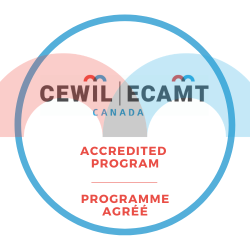Manufacturing Engineering Technician (Co-op)

*Domestic applicants include Canadian citizens, permanent residents, protected persons and Convention refugees.
If a career in the manufacturing sector excites you and you’re looking for an opportunity to gain hands-on experience while studying, the Manufacturing Engineering Technician (Co-op) program is for you. Your technical skills will be put to the test, learning and enhancing your skill-set for the modern manufacturing sector.
Students begin the CNC machine operator course by examining the finer points of numerically controlled machine programming, tool design, production planning, statistical process control, value engineering, advanced machining and maintenance engineering throughout the manufacturing industry. You’ll be trained on cutting-edge numerically controlled CNC and CAD/CAM equipment, giving you an advantage in the workforce once you graduate. In the pursuit of your manufacturing technician certification, you’ll also be trained to evolve your skills alongside the always-changing manufacturing sector – an opportunity for lifelong learning.
The program consists of four academic levels and eight months of co-op working in industry. The program prepares graduates for employment in areas such as numerically controlled machines programming, tool design, production planning, statistical process control, value engineering, advanced machining and maintenance engineering throughout the manufacturing industry. Modern numerically controlled CNC and CAD/CAM equipment is utilized in this program.
The Manufacturing Engineering Technician program offers a cooperative education component, which provides students the opportunity to gain invaluable first-hand workplace experience in their chosen field. Here are some co-op jobs that have kick-started the careers of Manufacturing Engineering Technician students before even graduating!
Team Member
Contribute to continuous improvement and cost-reduction activities; load, unload and monitor production equipment.
Project Coordinator
Provide coordination and support to various aspects of operations to ensure the efficient and profitable execution of the installation of underground utility infrastructure.
Engineering Technologist
Build prototype parts, loading parts into fixtures, running robot weld jobs, manage inventory, handle raw and finished goods and packaging.
For more information regarding co-op, please check out our co-op site or contact the Co-op Office at coop@fanshawec.ca to connect with a consultant.
Graduates of Fanshawe’s Manufacturing Engineering Technician program will have the fundamental skills and knowledge to work as a junior analyst in numerical control programming, tool design, basic production tooling and process planning, manage statistical process control methods, undertake cost reduction studies, provide value analysis assistance, work on production equipment maintenance methods and many other careers in the manufacturing industry.
Did you know Fanshawe consistently ranks high in graduation employment rates among large colleges in Ontario?
Here are some examples of career opportunities for graduates of Fanshawe’s Manufacturing Engineering Technician (Co-op) program:
Manufacturing Technician
Design, develop, install, manage, and maintain equipment to limit production downtime.
Junior Programmer Analyst
Apply your knowledge on programming to design technology solutions to meet the evolving needs of the organization.
Process Technician
Run, maintain and monitor equipment and record changes occurring in the manufacturing process.
| Year | Fall | Winter | Summer |
| Year 1 | Start Level 1 | Level 2 | Level 3 |
| Year 2 | Co-op | Level 4 | Co-op/End |
| Year | Winter | Summer | Fall |
|---|---|---|---|
| Year 1 | Start Level 1 | Level 2 | Level 3 |
| Year 2 | Co-op | Level 4 | Co-op/End |

This program is accredited by Co-operative Education and Work Integrated Learning Canada. This accreditation represents the highest standard of achievement for co-operative education programs in Canada, and recognizes Fanshawe's commitment to excellence.
The graduate has reliably demonstrated the ability to:
1. analyze and solve routine technical problems* related to manufacturing environments through the application of engineering principles.*
2. conduct routine analysis* of components, processes, and systems through the application of engineering principles* and practices.*
3. interpret and prepare graphics* and other technical documents* to appropriate engineering standards.
4. use computer hardware and software to support the engineering environment.
5. apply knowledge of manufacturing materials, operations, and processes to support the production of components.
6. apply knowledge of machinery, tools and other equipment to manufacture and assemble components.
7. conduct quality control and quality assurance procedures as required.
8. recognize the environmental, economic, legal, safety, and ethical implications of manufacturing projects.
9. use and maintain documentation, inventory, and records systems.
10. contribute to the implementation of a manufacturing project.
11. develop strategies and plans to improve job performance and work relationships.

Join Us for Open House
Find out if Fanshawe is the right fit for you at Open House. Explore Fanshawe's campuses, meet faculty and current students, and ask your questions about starting college.
Martin Volkening
| Test | Score |
|---|---|
| TOEFL iBT | Overall score of 4.5 with no score less than 4 in any band |
| IELTS Academic | Overall score of 6.0 with no score less than 5.5 in any of the four bands |
| CAEL | Overall score of 60 with no score less than 50 in any of the four bands. score of 80 in listening |
| PTE Academic | Minimum score of 53 with no score less than 45 in any of the four bands |
| Cambridge English | Overall score of 169 with no language skill less than 162 |
| ESL4/GAP5 | Minimum grade of 80% in Level 8, 75% in Level 9, or 70% in Level 10 |
| Duolingo | Overall score of 105, with no score lower than 95 |
| LANGUAGECERT | Overall score of 65 with no score less than 60 in any of the four skills |
| Level 1 | ||||
| Take all of the following Mandatory Courses: | ||||
| WRIT-1039 | Reason & Writing 1-Technology | 3 | ||
| This course will introduce technology students to essential principles of reading, writing, and reasoning at the postsecondary level. Students will identify, summarize, analyze, and evaluate multiple short readings and write persuasive response essays to develop their vocabulary, comprehension, grammar, and critical thinking. | ||||
| LAWS-1038 | Law, Ethics & Occupational H&S | 3 | ||
| This course explores the structure, practice, and ethics related to the world of work. The fundamental legal principles and ethics practised by employers are examined. Maintaining a safe, healthy, and stable work environment is a focus of this course where students learn elements of the regulations and codes of conduct for the workplace. Students develop an understanding of the history and relevance of various workplace mandates such as WHMIS, health & safety committees, and the Canadian legal system. | ||||
| ENGR-1024 | Engineering Graphics | 3.5 | ||
| This course is an introduction to theoretical and practical aspects of engineering drawings. 2D (AutoCAD) and 3D (Solid Works) CAD software will be introduced and applied to related projects and assignments. Orthographic reading, dimensioning and fasteners will also be covered. Drawings will be produced and plotted using both the AutoCAD & Solid Works software. | ||||
| MATH-1219 | Math Fundamentals | 4 | ||
| This course is an introduction of fundamental math that includes basic algebraic operations, unit conversions and data accuracy, functions & graphs, trigonometric functions, basic factoring, working with fractions and exponential & logarithmic functions. | ||||
| MACH-1154 | Machining 1 | 2 | ||
| This course will provide the student with an understanding of basic conventional machine tool theory and processes with an emphasis on machine setup & tooling. Calculations for speed, feed rate, machining times & production cost will be explored. Practical, hands-on machining projects will be assigned to students which will be submitted and evaluated. | ||||
| WELD-1054 | Welding | 2 | ||
| WELD-1054 Is designed to provide both theoretical and practical instruction in: welding shop safety, Shielded Metal Arc Welding, Gas Metal Arc Welding, Gas Tungsten Arc Welding, Oxy-Fuel and Plasma cutting. | ||||
| COMP-1555 | Computer Applications Fundamentals | 1.5 | ||
| This course is an introduction to the use of common computer applications such as MS Word, Excel & Power Point. The students will be introduced to the formatting, manipulation and presentation of data. | ||||
[1] Total program costs are approximate and subject to change. They do not include additional fees such as the health and dental plan, bus pass, or general expenses. Learn more about ancillary and additional fees.